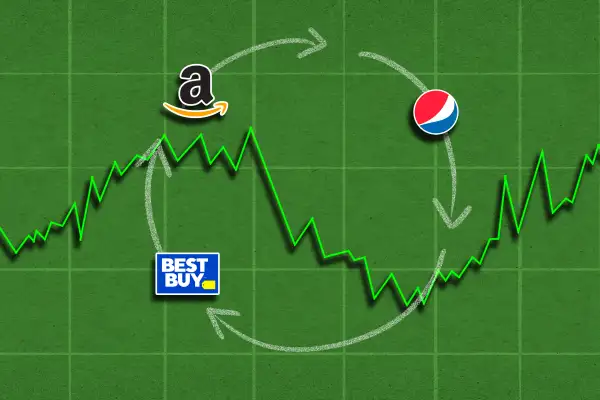Why Stock Buybacks From Amazon and Other Big Companies Could Be Good for Investors
Money is not a client of any investment adviser featured on this page. The information provided on this page is for educational purposes only and is not intended as investment advice. Money does not offer advisory services.

Major companies like Amazon and Best Buy are buying back their own shares amid a rough period for the stock market. That could be a good thing for investors.
Companies in the S&P 500 and Russell 3000 have outlined stock buyback plans valued at $306 billion as of March 11, which is high for this point in the year, according Goldman Sachs Group.
Last week, Amazon announced that its board had approved a buyback of up to $10 billion worth of shares, and earlier in the year, Union Pacific announced plans for repurchasing plan valued at around $25 billion. Pepsi and Best Buy are among other companies that have unveiled stock buy-back plans this year.
Stocks have struggled so far in 2022 amid expectations that the Federal Reserve will raise interest rates and the war in Ukraine, which has pushed up commodity prices. The S&P 500 is down 10% for the year.
The boom in stock buybacks mainly reflects companies taking advantage of cheaper capital now that their stock prices are down, says Jim Paulsen, chief investment strategist of The Leuthold Group. But it could also be a good sign for the future of the stock market, he adds.
"You see a lot of company buybacks start near market lows, and a lot of times companies are starting to see how cheap their stock is relative to what they start to see in their fundamentals," Paulsen says.
With a stock buyback, companies can improve their own stock price by decreasing the number of shares on the market. As the number of shares held by the public decreases, the ownership stake of the shares on the public market should increase, along with the share price.
Say, hypothetically, there are 100 shares trading on the public market and each is worth $10. When a company buys some of its own stock, there are fewer shares available to buy — and suddenly those remaining shares up for grabs are worth more than $10.
In 2018 and 2019, nearly one in four companies increased their earnings per share (EPS) by at least 4% after executing a stock buyback, according to Howard Silverblatt, senior index analyst at S&P Dow Jones Indices. While the number of companies upping their EPS with stock buybacks is not quite as high as that pre-pandemic level, the trend of companies repurchasing their own shares is certainly making a comeback.
As Paulsen notes, buybacks can indicate that a company feels confident about its financial future, which can be a good sign for shareholders. In general, companies appear to be predicting that this volatile market will subside, and their stock prices will come back up.
There is a flip side to stock buybacks. Critics say that instead of spending cash on their own stock, companies could be putting that money elsewhere, like towards employee compensation or research for new projects.
"When you're just buying back shares, you're not doing anything to ensure the ability of your company to generate value for shareholders in the future," says Richard Smith, financial cycles expert, and founder and CEO of risk management tool RiskSmith. "You're not investing in things that are going to make your business more productive, more profitable, more innovative."
Critics also say buybacks only artificially boost a company's stock price.
In December, the Securities and Exchange Commission proposed more disclosure requirements around stock buybacks, including companies needing to provide "objective or rationale for the share repurchases and the process or criteria used to determine the repurchase amounts."
More from Money:
What Soaring Gas and Oil Prices Mean for Your Investments
7 Best Online Stock Trading Platforms of 2022
Amazon Approved a 20-for-1 Stock Split. Does That Mean It's a Good Time to Buy?
